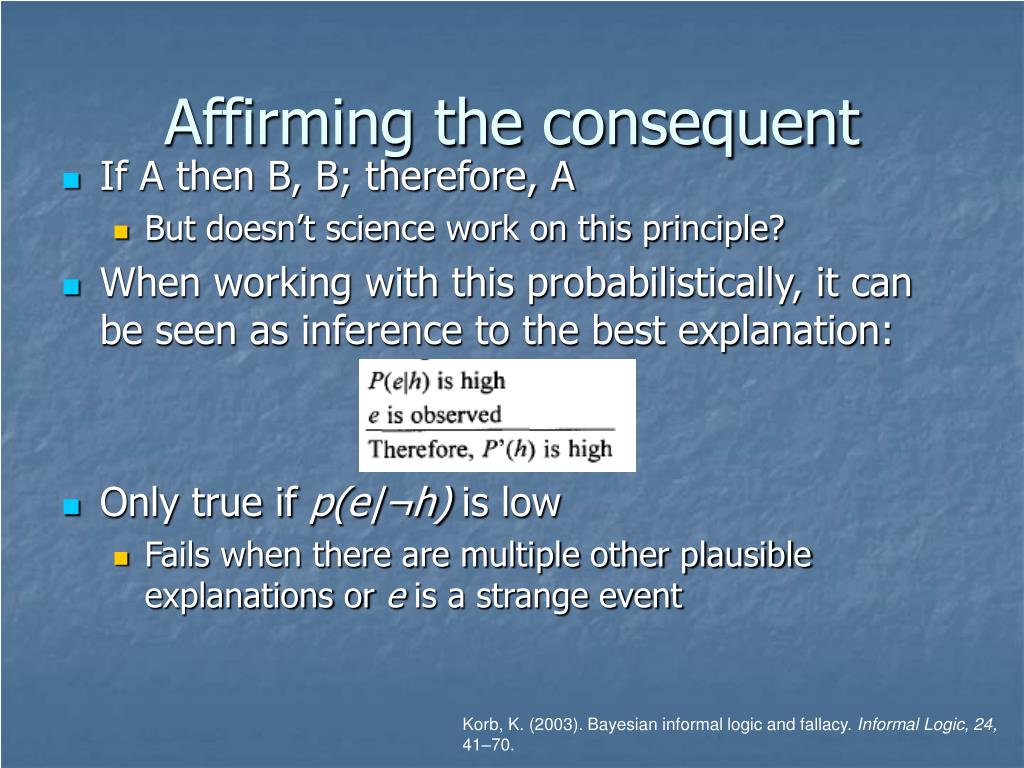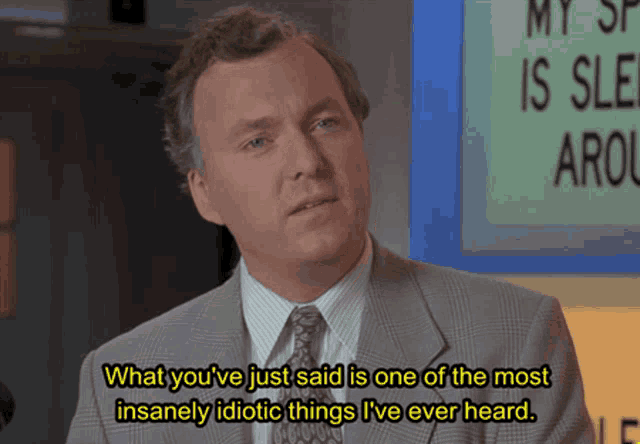You know nothing about logic.You are just making the same logical fallacy over again.
This time you add a reductio ad absurdum fallacy to it.
What is universal to humans does not have to be universal to all animals. We are discussing humans, not all animals, or even not all life.
You are using an out of date browser. It may not display this or other websites correctly.
You should upgrade or use an alternative browser.
You should upgrade or use an alternative browser.
Is a Public Philosophy Still Possible?
- Thread starter Hume
- Start date
T. A. Gardner
Serial Thread Killer
So? Humans are a subset of animals. There are things universal to humans, that aren't necessarily universal to animals. That doesn't invalidate the argument. Trying to say it does is a reductio ad absurdum fallacy.He is saying humans are animals.
You know nothing about logic.

you're a dopeSo? Humans are a subset of animals. There are things universal to humans, that aren't necessarily universal to animals. That doesn't invalidate the argument. Trying to say it does is a reductio ad absurdum fallacy.
You are just making the same logical fallacy over again.

This time you add a reductio ad absurdum fallacy to it.
What is universal to humans does not have to be universal to all animals. We are discussing humans, not all animals, or even not all life.
In effect, you are making the reverse argument that the animal rights movement makes.
No. You are making up a new definition of "universal". You can't say something ONLY applies to ONE animal and then call it "Universal".
So? Humans are a subset of animals. There are things universal to humans, that aren't necessarily universal to animals.
Then it isn't universal. That's kind of integral to the definition.
T. A. Gardner
Serial Thread Killer
It is universal to humans. You are unable to grasp that simple concept.Then it isn't universal. That's kind of integral to the definition.
It is universal to humans.
Then not universal per se, got it.
You are unable to grasp that simple concept.
Probably because it is meaningless. The word "universal" is a bit more expansive than just applied to one subset.
You might want to hit up a dictionary.
Universal: "Something that is universal relates to everyone in the world or everyone in a particular group or society."Then it isn't universal. That's kind of integral to the definition.
Did you think Universal healthcare, or the Universal Declaration of Human Rights applies to aardvarks and dung beetles?
Humans can percieve abstract concepts because we have reason and logic. Animals operate on instinct
T. A. Gardner
Serial Thread Killer
Okay I looked it up in a dictionary. Actually, several dictionaries. Note the highlighted part.Then not universal per se, got it.
Probably because it is meaningless. The word "universal" is a bit more expansive than just applied to one subset.
You might want to hit up a dictionary.
universal
1 of 2adjective
uni·ver·sal ˌyü-nə-ˈvər-səl3 a: embracing a major part or the greatest portion (as of humankind)
a universal state
universal practices
universal /ˌjuːnəˈvɚsəl/
: done or experienced by everyone
- universal human emotions
- an idea with universal appeal/acceptance
- universal health care
- universal suffrage [=the right for all adults in a country to vote]
u·ni·ver·sal
[ˌyo͞onəˈvərs(ə)l]
adjective
- of, affecting, or done by all people or things in the world or in a particular group; applicable to all cases:
Universal: "Something that is universal relates to everyone in the world or everyone in a particular group or society."
Did you think Universal healthcare, or the Universal Declaration of Human Rights applies to aardvarks and dung beetles?
Humans can percieve abstract concepts because we have reason and logic. Animals operate on instinct
Universal is not solely limited to humans.
If it is then you will have to determine EXACTLY what makes humans a quantum change from other animals. Go ahead. Give it a shot.
(Hint: remember you are NOT able to read animal minds. Just in case you wanted to start telling people what is in their minds.)
Okay I looked it up in a dictionary. Actually, several dictionaries. Note the highlighted part.
universal
1 of 2
adjective
uni·ver·sal ˌyü-nə-ˈvər-səl
3 a: embracing a major part or the greatest portion (as of humankind)
a universal state
universal practices
universal /ˌjuːnəˈvɚsəl/
: done or experienced by everyone
: existing or available for everyone
- universal human emotions
- an idea with universal appeal/acceptance
- universal health care
- universal suffrage [=the right for all adults in a country to vote]
u·ni·ver·sal
[ˌyo͞onəˈvərs(ə)l]
adjective
- of, affecting, or done by all people or things in the world or in a particular group; applicable to all cases:
Universal is not limited only to humans.
And, again, since humans are a subset of animals then you must explain WHY a "universal" would only apply to humans and not other animals. Go ahead and tell me what that key difference is (and do it without claiming knowledge of what animals can think and what the content of their minds is since you can't read other minds)
T. A. Gardner
Serial Thread Killer
Universal is not limited only to humans.
And, again, since humans are a subset of animals then you must explain WHY a "universal" would only apply to humans and not other animals. Go ahead and tell me what that key difference is (and do it without claiming knowledge of what animals can think and what the content of their minds is since you can't read other minds)

Universal: per the Oxford English Dictionary:
affecting or involving the whole of something.
So far you and @Cypress want that to be limited to HUMANS. But humans are actually part of a larger set that there is no easy way to break up into subsets. If something applies to one member of the larger set then it applies to all members of the larger set and would then be universal in scope.
If it only applies to one subset of the larger set and that subset is ARBITRARILY DEFINED then it is not universal.
It would be like claiming morality is universal but it ONLY applies to Bob Smith who lives down the road. There is no definition in which the concept of "universality" would only apply to one subset of the larger set.
Unless you can make a solid argument that humans are somehow SO FUNDAMENTALLY DIFFERENT from all other members of the larger set you can't really call it "universal".
Unless you think "universal" can also be applied to one person.
affecting or involving the whole of something.
So far you and @Cypress want that to be limited to HUMANS. But humans are actually part of a larger set that there is no easy way to break up into subsets. If something applies to one member of the larger set then it applies to all members of the larger set and would then be universal in scope.
If it only applies to one subset of the larger set and that subset is ARBITRARILY DEFINED then it is not universal.
It would be like claiming morality is universal but it ONLY applies to Bob Smith who lives down the road. There is no definition in which the concept of "universality" would only apply to one subset of the larger set.
Unless you can make a solid argument that humans are somehow SO FUNDAMENTALLY DIFFERENT from all other members of the larger set you can't really call it "universal".
Unless you think "universal" can also be applied to one person.
I accept your giving up. Just because you want words to mean only what you want and not what they actually mean doesn't make your argument ipso facto correct.
T. A. Gardner
Serial Thread Killer
I accept your giving up. Just because you want words to mean only what you want and not what they actually mean doesn't make your argument ipso facto correct.

Seriously? You honestly think universal ONLY applies to humans?????????????????
That truly is one of the most truly insanely idiotic things I've ever heard.
Have to agree with Gardner. The issue was whether morality is universal for humans. Not universal for all living beings.
Then there's some way you can split the set up. Why does this "universal" only apply to SOME animals?
Remember: the reason people propose "universal" moral laws is to make the moral laws something OTHER than the mere conventions taken up by humans.
If we define "Universal" to ONLY applying to one small subset of animals then it truly is just relative to that one subset of animals.
And when something is RELATIVE it is hardly UNIVERSAL.
If we define "Universal" to ONLY applying to one small subset of animals then it truly is just relative to that one subset of animals.
And when something is RELATIVE it is hardly UNIVERSAL.
